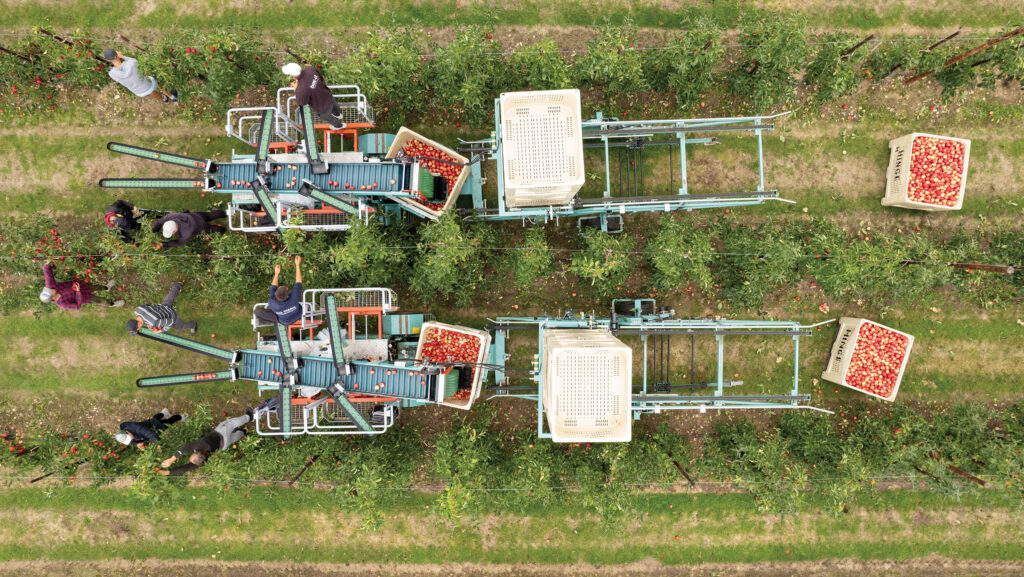Industry leaders welcome five-year seasonal worker pledge
 © British Apples and Pears
© British Apples and Pears The government has committed to extending its Seasonal Worker Scheme by a further five years to 2029, as part of a package of measures announced to support farmers ahead of Rishi Sunak’s ‘Farm to Fork’ summit next week.
Industry leaders say the seasonal workers commitment, which will see 43,000 temporary work visas available to the horticulture sector next year, plus another 2,000 for poultry, will give farmers and growers much needed certainty to plan for the future.
The government is also allocating £50m of additional funding for new technology to support fully automated packhouses, with the lofty aim of providing more support to bring robotic crop pickers on a par with human pickers in three to five years.
See also: Retailers tell Efra MPs seasonal labour is ‘biggest issue’
However, meat and dairy industry representatives expressed frustration that the government is pursuing seasonal workers when it is full-time, year-round jobs their industries need (see “Meat and dairy leaders lament lack of focus on permanent jobs”).
Meat and dairy leaders lament lack of focus on permanent jobs
Meat and dairy industry businesses have year-round jobs they cannot fill, which means these UK sectors are not working at full capacity.
The Skilled Worker visa list includes occupations such as butchers, farm managers and farmers.
But Tony Goodger, spokesperson for the Association of Independent Meat Suppliers, says UK businesses are struggling to attract skilled workers from overseas due to the high cost of living in the UK and competition from other countries across the globe.
The NFU welcomed the government’s seasonal worker announcement, but said it does not address the shortage of permanent staff in the dairy industry.
NFU Dairy Board chairman Paul Tompkins said: “A lack of availability of people coming from overseas means we need to encourage more people in the UK to work on our farms.”
Jack Ward, chief executive of the British Growers Association, said: “This is a massive vote of confidence in the importance of the UK fresh produce industry.
“Finding a long-term solution to the ongoing shortages of seasonal labour is absolutely crucial.
“This idea of investing in world-leading technology that puts us at the forefront of the fresh produce industry has the potential to be really exciting.”
Mr Ward said at certain times of the year, UK consumers rely on British growers for “pretty much 100% of their fresh produce”.
“This is going to enable us to invest to make sure UK consumers have continuity of supply of high-value UK produce,” he added.
“This will help us deliver fresh produce for a nation that needs to eat a lot more [fresh produce] than it currently does.”
‘Pleas answered’
Ali Capper, executive chairwoman of trade body British Apples and Pears, told Farmers Weekly her pleas had been answered over long-term security of the Seasonal Worker Scheme (SWS).
“This announcement has given much needed confidence to growers planning the future of their horticulture businesses.
“For orchards, which require 20-year investment commitments, this announcement provides the confidence that businesses need.”
Ms Capper said UK growers currently supply about 40% of apples to the UK market, and have a stated ambition to grow this to 60%.
“What is really important for government to understand is that we, as a sector, want to grow – we want to produce more apples and pears – and that means more labour, not less,” she added.
John Shropshire verdict
This long-awaited announcement from government was made in direct response to John Shropshire’s Independent Review into Labour Shortages in the Food Supply Chain.
Mr Shropshire welcomed the “headline announcement” of an extension to the SWS, but he was disappointed that the visa length remains at six months, as the protected cropping industries of tomatoes, cucumbers and peppers require a nine-month visa to match the length of their season.
